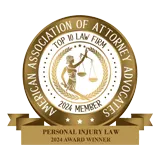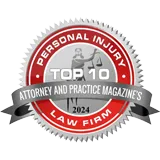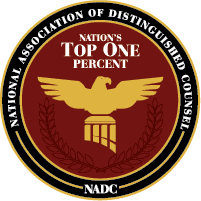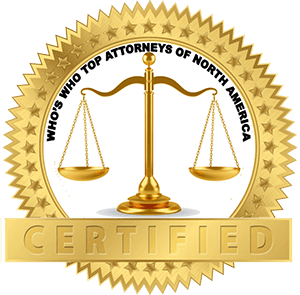Wisconsin Snowmobile Accident Lawyers
Winter recreation brings families and friends together on Wisconsin’s snowy trails, but snowmobiling accidents can turn a fun day into a tragedy. High-speed collisions occur on icy trails, mechanical failures cause riders to lose control, and poorly maintained paths create hidden dangers that lead to catastrophic injuries.
If you’ve been seriously injured in a snowmobile accident and someone else was responsible, you may be able to seek compensation for medical bills, lost wages, and other damages. At Nowlan Personal Injury Law, we know the challenges that snowmobile accident victims face in Wisconsin, and we’re here to fight for the full compensation you need. Our team has recovered millions of dollars for accident victims across Southern Wisconsin, and we’re ready to put that same dedication to work for your family.
Why Hire Us for Your Snowmobile Accident Claim?
Snowmobile crashes often happen in remote locations where evidence can be easily lost. They can also be complicated due to multiple potential defendants (e.g., tour operators, trail managers, or snowmobile manufacturers). Our snowmobile accident lawyers know how to investigate these cases and fight for the results our clients need to move forward.
- Decades of Injury Law Experience: We’ve handled a range of accident cases, including snowmobile crashes. Our experienced attorneys know what it takes to prove negligence on the trails and secure compensation for our clients. We don’t settle for offers that won’t cover your damages.
- We Take On Insurance Companies Directly: Insurers often deny or undervalue snowmobile injury claims. We push back against these strategies and prepare every case as if it’s going to trial. Insurance adjusters know we won’t back down when your recovery is at stake.
- No Fees Unless We Win: You don’t need to worry about upfront costs when you’re facing medical bills and lost income. We handle snowmobile injury cases on a contingency fee basis, which means you pay nothing unless we secure a settlement or verdict.
- Thorough Case Investigations: We gather witness statements, review trail conditions, inspect the snowmobile, and work with reconstruction specialists when needed. Evidence puts pressure on the other side to pay what your case is worth.
- Full-Value Claim Strategy: Some law firms rush to settle cases without evaluating all damages. We don’t take that approach. We account for every type of financial loss, including medical bills, lost earnings, and pain and suffering, so nothing gets overlooked.
Compensation You Can Seek After a Snowmobile Injury
Snowmobile accident victims can recover compensation for a wide range of damages. Our personal injury attorneys build each claim around your specific damages to ensure you receive fair compensation for all the ways the accident has affected your life.
- Emergency Medical Expenses and Future Care: You can recover the cost of ambulance transportation, emergency room treatment, surgeries, hospital stays, and all other medical care related to your injuries. Future medical expenses like ongoing physical therapy, rehabilitation, prescription medications, and specialized equipment are also recoverable.
- Lost Wages and Reduced Earning Capacity: Compensation may include wages you’ve lost while recovering and any reduction in your ability to earn income in the future. If your injuries prevent you from returning to your previous job or working the same hours, you can seek payment for that lost earning capacity.
- Pain and Suffering: Physical pain, emotional distress, and mental anguish caused by your injuries are compensable under Wisconsin law. Pain and suffering damages recognize that injuries affect more than just your finances and acknowledge the human cost of someone else’s negligence.
- Permanent Disability or Disfigurement: When injuries result in permanent limitations or scarring, you can seek additional compensation for these lasting effects. Disabilities that affect your mobility, cognitive function, or ability to enjoy life activities warrant separate damages beyond medical expenses.
- Property Damage: If you owned the snowmobile that was damaged or destroyed in the accident, you can recover the cost of repairs or replacement. This includes safety gear, clothing, and other personal property that was damaged in the crash. Property damage claims are usually straightforward, but should be documented with repair estimates and receipts for damaged items.
Common Causes of Snowmobile Accidents
Snowmobile accidents happen for many reasons, but most result from preventable factors like operator error, equipment problems, or trail hazards. Identifying the cause of your accident helps determine who can be held liable for your injuries. Our attorneys investigate each case to find all responsible parties and build the strongest claim for compensation.
- Collisions with Other Riders: Head-on crashes and side-impact collisions happen when riders travel too fast for conditions or fail to maintain control on narrow trails. Poor visibility during snowstorms or at night increases the risk of these accidents. When riders collide at high speeds, the injuries can be catastrophic and require immediate medical attention.
- Reckless or Impaired Driving: Alcohol and drug use impair judgment and reaction times, leading to dangerous riding behaviors. Reckless operators may speed through areas with limited visibility, ignore trail markers, or attempt dangerous maneuvers beyond their skill level. These behaviors put both the impaired rider and others on the trail at risk.
- Unsafe or Poorly Marked Trails: Trail maintenance companies and landowners have a responsibility to keep paths safe and mark hazards. When they fail to warn riders about obstacles, icy conditions, or trail changes, accidents can result. Inadequate signage or barriers can lead riders into dangerous areas where accidents are more likely.
- Mechanical Failures or Defective Equipment: Brake failures, steering problems, and defective throttles can cause riders to lose control. Manufacturers may be liable when design flaws or manufacturing defects contribute to accidents. Regular maintenance can prevent some mechanical issues, but defects aren’t always apparent until an accident occurs.
- Hidden Obstacles Under Snow: Rocks, fallen trees, and other debris can become hidden under fresh snowfall, creating unexpected hazards for riders. Property owners and trail managers should inspect and clear trails regularly to prevent these accidents. When obstacles aren’t marked or removed, riders can’t avoid them and may suffer serious injuries.
- Inadequate Supervision on Guided Tours: Tour companies have a duty to provide trained guides and maintain safe group sizes for different skill levels. When guides fail to brief riders on safety rules or allow inexperienced riders on difficult trails, accidents can happen. Tour operators may also be liable for providing defective equipment or failing to check weather conditions before departing.
Common Snowmobile Accident Injuries
Snowmobile crashes can cause severe injuries because of the high speeds involved and the remote locations where they tend to occur. Our snowmobile accident attorneys see the impact these injuries have on victims and their families and fight to secure compensation that covers both current and future medical needs.
- Traumatic Brain Injuries (TBI): Head injuries occur when riders hit trees, other snowmobiles, or are thrown from their machines. Even when wearing helmets, the force of impact can cause concussions, brain swelling, or permanent brain damage. TBI victims may face memory problems, personality changes, and the inability to work or care for themselves.
- Spinal Cord Injuries: Back and neck injuries happen when riders are thrown from snowmobiles or crushed during rollovers. Depending on their severity, they can result in partial or complete paralysis. Spinal cord injury victims can need lifetime medical care, home modifications, and assistance with daily activities.
- Fractures and Broken Bones: Arms, legs, ribs, and pelvis fractures are common when riders hit obstacles or are thrown during impact. Multiple fractures may require surgeries, metal implants, and months of physical therapy. Some broken bones don’t heal properly, leaving victims with permanent limitations and chronic pain.
- Internal Organ Damage: Blunt force trauma can damage organs like the liver, spleen, kidneys, or lungs during high-impact crashes. Internal bleeding may not be immediately apparent but can be life-threatening without prompt medical treatment.
- Crush Injuries or Amputations: Riders can be pinned under snowmobiles or caught between machines during accidents, causing severe crushing injuries. In the worst cases, limbs may be so damaged that amputation becomes necessary. These injuries require extensive reconstruction surgeries and prosthetic devices.
- Cold-Related Injuries (Hypothermia, Frostbite): When riders are injured and stranded in remote areas, exposure to cold weather can cause additional injuries. Hypothermia and frostbite can develop quickly in Wisconsin winters, especially if victims can’t move or seek shelter. These conditions can cause permanent tissue damage and complicate recovery from other injuries.
What To Do After a Snowmobile Accident
When you’ve been hurt in a snowmobile accident, your priority should be getting medical attention, even if you feel fine initially, due to an adrenaline rush, head injuries, internal bleeding, and spinal cord damage may not show symptoms right away. Emergency responders can also document your injuries, which becomes important evidence for your claim.
While you’re waiting for help to arrive, take the following steps, asking bystanders for assistance if necessary.
- Report the Crash to Law Enforcement: Contact the local police or sheriff’s department to report the accident and request an official investigation. Officers will document the scene, interview witnesses, and create a police report that can support your case.
- Document the Scene: Take photos of all snowmobiles involved, as well as trail conditions and any obstacles or hazards that contributed to the crash. Use your phone’s GPS to record the exact location of the accident, as remote areas can be difficult to locate later.
- Get Names of Any Witnesses: Collect contact information from other riders, guides, or bystanders who saw the accident happen. Witness testimony can be invaluable when liability is disputed or when insurance companies try to blame you for the crash.
- Don’t Give a Recorded Statement to Insurance Providers: Insurance adjusters may contact you quickly after an accident and ask for a recorded statement about what happened. Don’t do it without speaking to an attorney first, as these statements can be used against you later.
- Call a Snowmobile Accident Lawyer as Soon as Possible: Contact an experienced snowmobile accident attorney as soon as you know you’ve suffered compensable injuries. We can handle communications with insurers, investigate your case while evidence is still available, and file a personal injury claim on your behalf.
Get a Free Consultation From a Snowmobile Accident Lawyer
Snowmobile accidents can leave you stressed, in pain, and worried about your future. To make matters worse, insurance companies aren’t on your side and will work to minimize what they pay you for your injuries and losses.
At Nowlan Personal Injury Law, our team has helped injured clients recover millions of dollars for the harm they’ve suffered in preventable accidents. We know how to investigate snowmobile crashes, identify all liable parties, and build strong cases that get results. For more information, contact us today for a free, no-obligation consultation.














